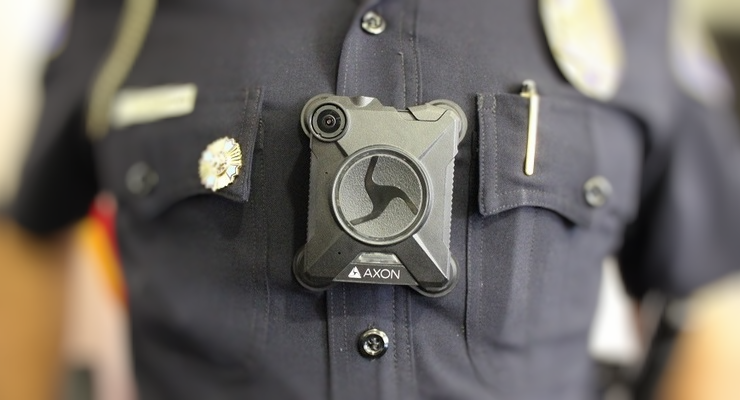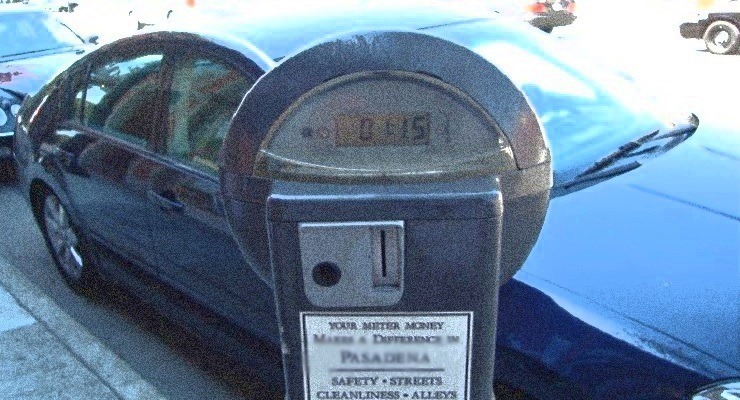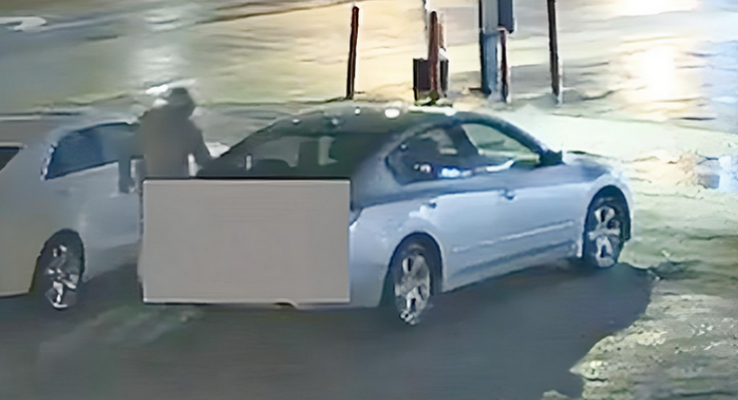[Editor’s Note: This is the first of a two-part series about license plate readers in Pasadena and Southern California.]
Each time you drive by a police cruiser in Pasadena, your vehicle information and exact location may be recorded and stored in a database for years, allowing police to learn potentially important information about where you spend your time.
In cities across the country, police are tracking the movement of vehicles and using that information to solve crimes and locate fugitives. However, privacy advocates argue innocent people are being tracked like criminals.
“We’re not all criminals in society, and I think the way that law enforcement has been using this kind of data is under the assumption we all are or will be in the future,” said Jennifer Lynch, staff attorney for the Electronic Frontier Foundation. “We have limitations on law enforcement’s ability to collect information about us to protect our privacy.”
 Inside the patrol car, police officers use a console similar to this one. Multiple vehicles are shown (from both the left-side and right-side cameras). The pictured vehicle’s image and plate number and the stolen vehicle alert alarms typically appear about 1.5 seconds after the patrol car has read the license plate. [Photo: “Automated License Plate Recognition Systems: Policy and Operational Guidance for Law Enforcement”]
Inside the patrol car, police officers use a console similar to this one. Multiple vehicles are shown (from both the left-side and right-side cameras). The pictured vehicle’s image and plate number and the stolen vehicle alert alarms typically appear about 1.5 seconds after the patrol car has read the license plate. [Photo: “Automated License Plate Recognition Systems: Policy and Operational Guidance for Law Enforcement”]Prior to the proliferation of automated license plate readers in Southern California within the last five years, police officers would drive down the street and call dispatch with license plate numbers of suspicious vehicles to check for fugitives or stolen vehicles. These days, that time-consuming task is frequently performed automatically and with much greater efficiency by complex camera systems placed on police cruisers or mounted in strategic locations along highways or busy streets.
Hundreds of automated license plate readers are operating in Los Angeles County. The Pasadena Police Department has used them for several years since buying the first one with a federal grant.
The police department’s first arrest using this relatively new technology came in January 2012 when the system alerted an officer of a stolen vehicle. Since then, the program has expanded as the city council has approved the purchase of several more units. Authorities said the department has five units currently used in patrol vehicles.
“Wherever that officer happens to be going, they’re reading the license plates around them as they’re driving,” Lt. Pete Hettema said.
The Pasadena Police Department uses the PIPS Police ALPR Graphical Interface System which has four cameras and can check as many as 3,600 plates per hour. The system captures an image of the license plate for any vehicle — parked or in motion — in the area and checks it against databases of stolen vehicles or vehicles linked to warrants or Amber Alerts.
Within a second, the computer gives an audible and visual alert if there is a match. Before stopping the vehicle, the police officer must double-check the license plate number against the picture because the system can occasionally read the number inaccurately.
The license plate number, date, time and geographic coordinates for every vehicle seen by the automated reader are immediately added to a local database. The Pasadena Police Dept. demonstrated how their system works. An officer typed in one license plate number and pulled up eight or nine locations on a map where the vehicle had been photographed around the city.
Police insist the database is an important tool. [In fact, just two nights ago officers were able to arrest an armed parolee driving a stolen U-Haul truck thanks an alert from this equipment in their cruiser. See here: “Police Nab Armed Parolee in Stolen U-Haul Wednesday Night“—Editor] The Los Angeles Police Protective League published a blog post earlier this month arguing that misunderstanding is driving much of the fear about license plate data. They cited a case where Los Angeles Police Department officers tracked a rape and sodomy suspect to Las Vegas by using historical sightings of the suspect’s vehicle.
“Legislative efforts seek to limit both the use and retention of collected LPR (license plate reader) data, which would significantly hinder law enforcement’s ability to conduct investigations into major crimes, putting the public and officers at greater risk,” the police union wrote.
Pasadena Officer Luis Banuelos said he can enter a partial license plate number in the system, and every car that has been photographed with a license plate containing the partial information will show up. That allows police to sift through car photographs, hopefully locating a car with same partial plate information that also matches the suspect car’s color, make and model.
“We solve crimes so often by just getting partial plates through this system,” Banuelos said.
However, the American Civil Liberties Union worries the system will be abused.
“The tracking of people’s location constitutes a significant invasion of privacy, which can reveal many things about their lives, such as what friends, doctors, protests, political events, or churches a person may visit,” the ACLU wrote in a statement last week.
In the second and final part of our investigation into license plate readers to be published August 5, Pasadena Now looks at what happens to the data that is collected.
Matt Thacker is a reporter who recently returned to his native California after spending almost all of his life so far in the Midwest. His passion for journalism started while writing for the student newspaper at the University of Louisville in Kentucky. After graduating with an English degree, he spent four years as the police and courts reporter for the News and Tribune in Jeffersonville, Ind. He won statewide awards for deadlines news, feature reporting and ongoing news coverage. His series of articles about a funeral home director accused of defrauding customers was selected as a finalist for story of the year by the Hoosier State Press Association Foundation in 2010. He has covered a U.S. Senate election, murder trials, police shootings and two natural disasters.














 0 comments
0 comments


